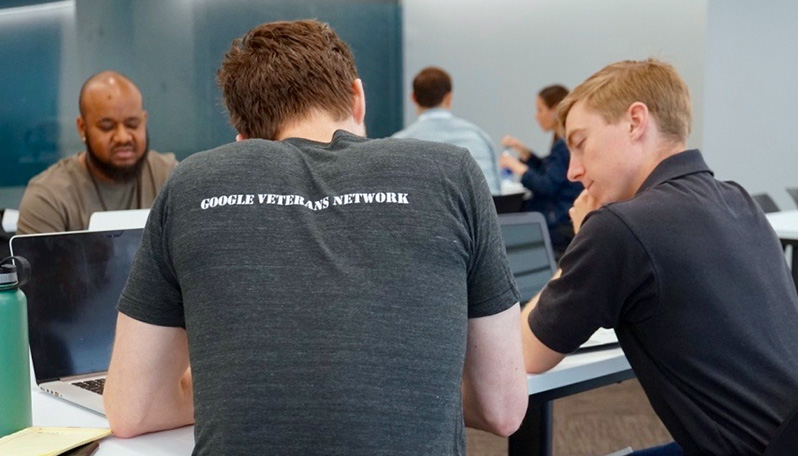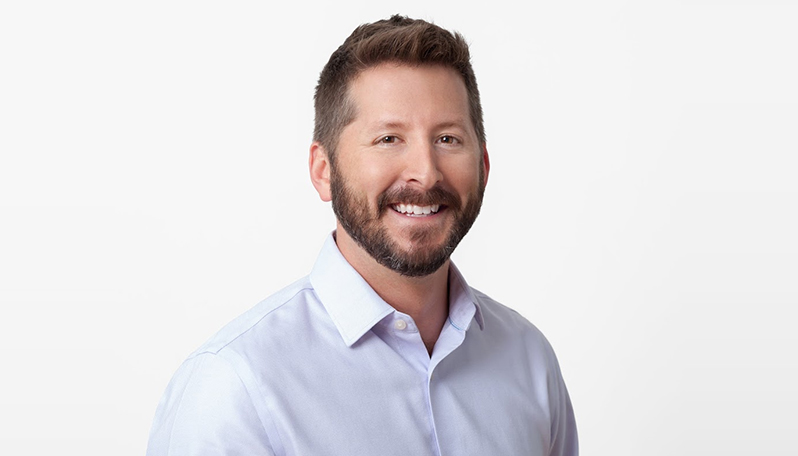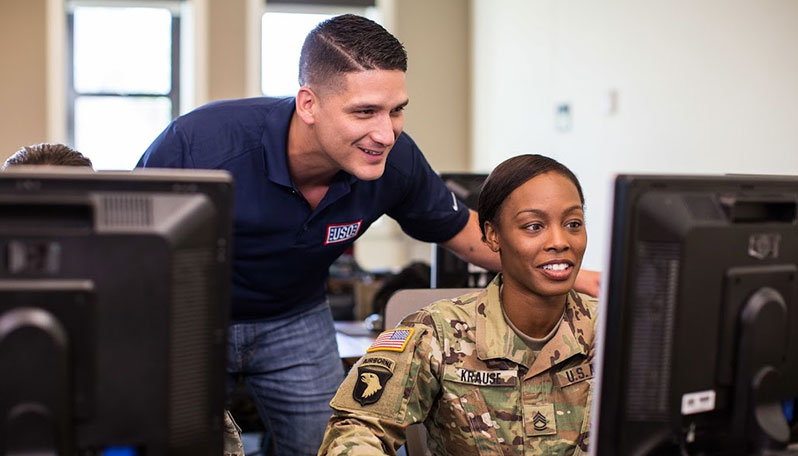Bringing the veteran's perspective to operations strategy at Google: Meet Niki Marin
When Googler Niki Marin was growing up, she wanted to be a professional tennis player; many members of her dad’s family, in fact, are pro players. Throughout the years, Niki was also inspired by peers drawn to military service. Fueled by her passion for social impact, she decided to pursue a very different journey. It’s taken Niki from her hometown to active duty in Afghanistan, and now to Jigsaw, a technology incubator team that deals with some of the world’s most challenging geopolitical problems.
Born and raised in St. Louis, MO, and after finishing high school in Naples, FL, Niki went on to college at the United States Military Academy (USMA) at West Point. There, she found that the teamwork-oriented nature of the school “appealed to my sense of purpose, discipline, dedication, personal courage, and selflessness,” she says.
At West Point, she majored in Business Management and minored in Systems Engineering. She continued her education at Central Michigan University, where she earned an M.S. in Administration. Upon graduation from West Point, she served in the U.S. Army and was deployed to Afghanistan, ultimately earning the rank of Captain and was honored with the Bronze Star medal. After she transitioned into civilian life, she worked in the finance industry, applying her business education. Merging her interests and experiences, she joined Google in 2015, first working on the business side of the company and then transitioning to her current role as Head of Strategy and Operations for Jigsaw.
We caught up with Niki to find out how she applies her military-honed skills to her work in the tech industry, in the context of tech designed for social impact.
Tell us about your role in StratOps at Jigsaw.
Jigsaw for me replicates a similar environment to the military in that the nature of the projects and people combine to develop camaraderie. It continues to be an honor to be in association with a group that focuses on creating meaningful change by addressing some of the world’s most pressing problems. I feel like Jigsaw’s mission and what it stands for align with my strong belief in service. Just as I was doing my small piece to accomplish a mission when I was in the military, at Jigsaw, I want to contribute to the success of our mission, too.
StratOps refers to strategic operations, which really means that I assist in making things function well. I manage the inner workings of Jigsaw, reducing friction to allow the team to do their best work. Our team tackles a range of global security challenges, including defending against digital attacks, mitigating the rise of online hate and harassment, countering online extremism, and fighting censorship. Think of it as the glue for the organization that sees across functions so that we work together to deliver our products and projects, maximize our impact with finite resources, and accomplish objectives that achieve a very ambitious goal of making users around the world safer with technology.
How do you apply specific skills you learned while in the service to your StratOps role?
Having run logistics patrols across a 750-square-kilometer area of Afghanistan under extreme scenarios where convoys were at the center of significant enemy-force targets, I had to exercise attention to detail to get essential supplies to American bases. Otherwise, I would put the mission and lives of the unit at risk. Managing vital equipment and the lives of soldiers taught me the value of deep operational planning that involved multiple functions – a key component of my current role at Jigsaw.
Additionally, the military taught me how to work with diverse sets of people and establish fruitful working relationships. Oftentimes, I managed patrols with local Afghans who did not speak the same language. And I worked with the Afghan national army, with members who, because of cultural history, did not see women in leadership roles (or in any operational capacity), and planned operations with other American units (infantry, engineering, medical, aviation). The experience of working across many groups and functions directly translates into how I interface with software engineers, product managers, researchers, and other teams within Jigsaw.
Finally, I think it’s important to recognize that I worked in a support function in the military that enabled others to do their best work. This understanding that outside of the spotlight lives a whole crew of people that make things work is something that I’ve taken with me. Similarly, at Jigsaw I work to remove barriers for others so that as a team we can focus on impactful projects.
You have chosen roles that bravely tackle tough challenges. What is your personal mission, and how does it align with your professional career trajectory?
I have a strong belief in setting the conditions that enable others to live and work to their potential. Sometimes that can come at my own expense. When I served in the U.S. Army’s ceremonial unit (The Old Guard), I became one of the first women to qualify for conducting ceremonies. I wore the traditional uniform, which was designed for men historically, and stood my ground as an all-male grading committee evaluated me. After conducting ceremonies, I would oftentimes be surrounded by girls asking me what it was like, or female high-ranking officers thanking me for representing women in this unit. This taught me that to live within your values and help others, you have to be willing to expose yourself and work hard to break barriers and prove yourself.
In any team that I am a part of, I have always worked to set an example and hold myself to very high standards. With this foundation, I have found roles and companies where I can add value, yet continue to grow professionally. It’s this foundation that guides my actions.
What advice do you have for veterans looking for roles in the tech industry?
My primary advice is to be comfortable with your story and start from a place of self-understanding.
Speaking from personal experience, I underestimated the value that I would bring to tech because I didn’t see the direct connection with the hard skills that I brought. Once I understood that I had a unique set of experiences and skills that were appreciated, and that Google’s values aligned with mine, I was better able to make an informed decision of what I wanted to do within the tech industry.
Some of us as veterans may not realize that we already have what it takes to work in tech. The next time you read a tech company’s site describing the qualities of thriving in ambiguity, or forging into the unknown, think to your own military experience and how you have already lived through that.
Secondly, I would advise others to leverage the veteran community. Unlike in other industries, the presence of veterans in tech isn’t as large, and so it becomes even more important to be intentional about networking with other veterans. That said, it’s important to not anchor yourself on a particular company or role at the expense of your values. Utilizing the veteran community and asking purposeful questions will be crucial to understanding where you would fit.
What tips do you have for women who are veterans, in terms of designing a career path that offers work-life balance as well as opportunities to grow as a professional?
Since I’ve been in situations (whether I realized it or not) where as a woman in a predominantly male environment of war, where I may have been seen by some as “less than,” simply because I was not a member of the majority or fit historical perceptions of a traditional “leader,” I don’t want other girls or women to ever feel that way. And if they do, I want them to know that they have a support system that enables them to get through those stages.
Whether it was in Afghanistan or being one of the first women to serve in a traditionally all-male ceremonial unit that never had female representation, I’ve had to forge my own path with the intended consequence of making it easier for others that followed to succeed. Just as other women before me did the same, I believe that it’s our individual duty to facilitate better paths for others.
I would suggest to other girls and women, please be confident with the skill-sets you bring to the table and always look for new and exciting ways to challenge yourself. But remember, as I’ve experienced, there's no direct path for anyone. Everyone will have a different story and perspective to share. Don't be afraid to forge your own!
Inspired by Niki? Apply for a job at Google to create, code, design and build for everyone.
Contact Us
Stay in touch. We want to hear from you. Email us at Acceleratewithgoogle@google.com
Please note that this site and email address is not affiliated with any former Google program named Accelerator.



